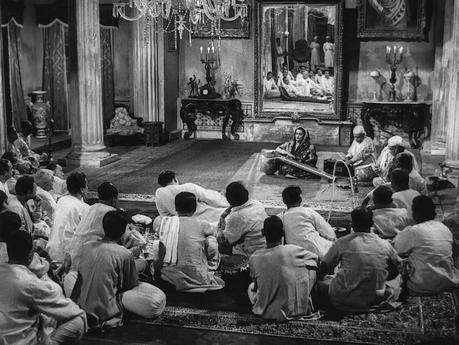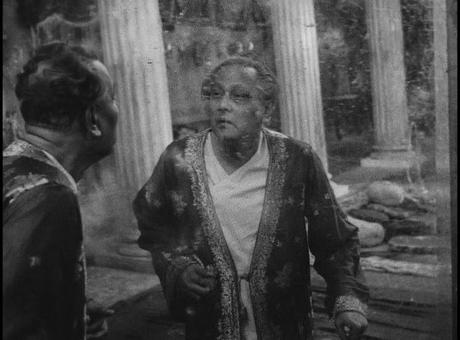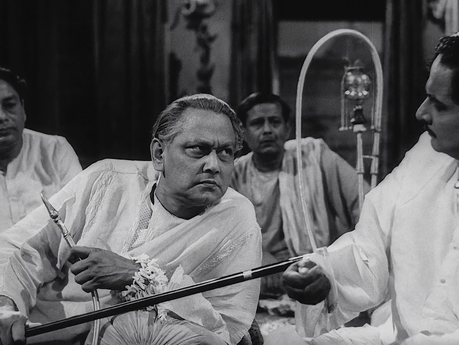 Couple of years ago when I was doing my Masters in US, one of my university friends was kind enough to lend me his copy of Apu trilogy. This was my first and so far only excursion into cinematic world of Satyajit Ray, probably the only Indian director with a worldwide fame and following. Considering how successful that experiment went, (it certainly was a success, so much so that Pather Panchali(1955) sits prettily in my personal ‘Top 100’) it is rather sad that I never saw any of his other films since. So I put one of his films on this year’s blind spot list, since that is what this list is for – to get rid of such blemishes.
Couple of years ago when I was doing my Masters in US, one of my university friends was kind enough to lend me his copy of Apu trilogy. This was my first and so far only excursion into cinematic world of Satyajit Ray, probably the only Indian director with a worldwide fame and following. Considering how successful that experiment went, (it certainly was a success, so much so that Pather Panchali(1955) sits prettily in my personal ‘Top 100’) it is rather sad that I never saw any of his other films since. So I put one of his films on this year’s blind spot list, since that is what this list is for – to get rid of such blemishes.Even though it is directed by Satyajit Ray, considering this is a Bengali film, this film also provides me a unique opportunity. Usually films I choose for this list are those which are supposed to have been seen my most people. So I try not to get into plot details and other usual suspects of review. But I would be very surprised if many of those who frequent this place would have seen this movie. So, for a change, I get to frame this post as a traditional review.Jalsaghar(1958) or The Music Room,as it is known internationally, is a story of Biswambhar Roy, a last of his kind landlord which means he is basically a royalty in areas surrounding vast pieces of lands he owns. It also used to mean that everyone leaving in that area would depend on him for their livelihood but his estate is in dilapidated state. He has inherited lands that are being depleted by river nearby and there is not much he can do about it. So he has the title and even respect of the people that comes with it but no perquisites that usually follow.
But his status in the community means he has to live pompous life his ancestors did, even if it is only to put up a show for others and pinnacle of his ostentation is his music room. His music room is where he would invite some of the best artists - singers, dancers, musicians - to put up a show for him and would invite most important people around to accompany him. Even being a part of this group would mean your entry in landlord's innermost circle and indication of your elevated social status.
 Only problem here, however, is Biswambhar Roy's estate is running on fumes and can not really afford all this extravagance. He even has to sell family jewels of Roy family that have been passed on for generations to pay for initiation ceremony of his son but even this doesn't deter him from his flamboyance. His wife tries to open his eyes but there is no other way he can live by and in the end, he succumbs to illusion of his grandeur, leaving his his last two remaining servants helpless witnesses of this event. His manager, who handles all his financial business and other things related to his lands, is solemn, worried where this might lead to while his man servant is almost giddy to see his master back to his old ways months after. [SPOILER]What he doesn't realize is this is candle burning brightest before extinguishing[SPOILER END].
Only problem here, however, is Biswambhar Roy's estate is running on fumes and can not really afford all this extravagance. He even has to sell family jewels of Roy family that have been passed on for generations to pay for initiation ceremony of his son but even this doesn't deter him from his flamboyance. His wife tries to open his eyes but there is no other way he can live by and in the end, he succumbs to illusion of his grandeur, leaving his his last two remaining servants helpless witnesses of this event. His manager, who handles all his financial business and other things related to his lands, is solemn, worried where this might lead to while his man servant is almost giddy to see his master back to his old ways months after. [SPOILER]What he doesn't realize is this is candle burning brightest before extinguishing[SPOILER END].Jalsaghar was Satyajit Ray's only third film; he made it between second and third installment of Apu trilogy. But, even though this was obvious right from Pather Panchali, sensibilities of this film are of a seasoned film maker. Premise of changing times and someone who once prospered in it failing to adapt to these times is not exactly novel. But what makes it work despite being the same old story is Satyajit Ray's handling with a knack of seasoned storyteller. He knows what he is going for, how he wants to get there and he does so right on the money.
He highlights hollowness of Roy's lifestyle from very first frame. His idiosyncratic behavior to keep up with it and cling on to stupid notions of his false status only make him more miserable and Ray does not flinch from showing this. But he doesn't make him spineless which makes it much more interesting character; someone I genuinely cared for despite being rather vain. He is not without his values, however vain they might be and not without his qualities either, however crazy they might be especially under the given circumstances.
Chhabi Biswas, playing protagonist Biswambhar Roy, makes it even more impressive with great range he puts on display here - from someone who is lordly from head to toe, riding his beautiful horse Moti to a hollow shell of that man we see in the very first scene with no idea of time and date. His ease and command with which he slips into persona of Biswambhar Roy also played major role in making me sympathetic towards him, despite all his glaring faults.
 While Roy is seeing the last days of his fading glory, Ray makes this story even more contrasting by adding character of Mohit Ganguly, son of userer leaving nearby, and making him a rising star. Roy constantly feels threatened by him as quite possibly he is looking to replace him. There are quite a few confrontational scenes between the two in film and almost every single one of them would find its place on highlight reel. Ganguly, being a self made man still not used to be a part of dignified society around him, is like a new kid on playing ground; always uncomfortable around Roy. And Roy, possibly because he himself not comfortable with his rise, constantly trying to cross him.
While Roy is seeing the last days of his fading glory, Ray makes this story even more contrasting by adding character of Mohit Ganguly, son of userer leaving nearby, and making him a rising star. Roy constantly feels threatened by him as quite possibly he is looking to replace him. There are quite a few confrontational scenes between the two in film and almost every single one of them would find its place on highlight reel. Ganguly, being a self made man still not used to be a part of dignified society around him, is like a new kid on playing ground; always uncomfortable around Roy. And Roy, possibly because he himself not comfortable with his rise, constantly trying to cross him.And finally, Indian classical music that is featured so richly in this film. I have to admit one thing though - however deplorable this guy might be, he certainly had a good taste in music. If you have any liking towards this kind of music, three concerts featured in this film alone are more than enough to make Jalsaghar worth a watch. Having artists from all over perform at your doorsteps like this, used to be a kingly habit of the class that Roy is last remnant. And Ray doesn't use them only to as a showcase of classical music but makes them very much integral parts of whole narrative. I feel really happy after getting back on Ray bandwagon with this film but this time I really hope my next stop won't be after another two years.

